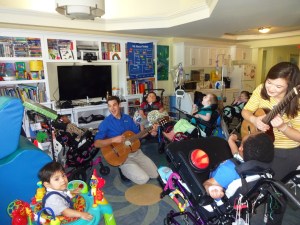 Belinda, Health Center Lifestyle Facilitator at Westminster Palms retirement community, has worked with many vendors serving older adults with dementia and other age-related conditions, but gives MTSP a very supportive endorsement.
Belinda, Health Center Lifestyle Facilitator at Westminster Palms retirement community, has worked with many vendors serving older adults with dementia and other age-related conditions, but gives MTSP a very supportive endorsement.
“Music Therapy St. Pete has been great. Music therapy engages each and every one of the residents as best as possible, increasing their orientation and amount of participation. The residents’ favorite music is used to bring back memories, encourage speech and song, and motivate exercises to the beat. The music therapists develop lasting and meaningful relationships, and continue to promote mood elevation and higher quality of life with every visit!”
 Ellie, wife of Mitchell, who had a stroke and is now receiving music therapy for his aphasia. We work on expressive communication, short term memory, and quality of life. Mitchell was Music Therapy St. Pete’s first client, though now receives individual sessions in his skilled nursing facility.
Ellie, wife of Mitchell, who had a stroke and is now receiving music therapy for his aphasia. We work on expressive communication, short term memory, and quality of life. Mitchell was Music Therapy St. Pete’s first client, though now receives individual sessions in his skilled nursing facility.
“My husband enjoys coming here, partly because he enjoys music, and putting music together with therapy for him is ideal. And I really enjoy coming here myself and seeing him make so much improvement. We’ve been coming for a while, and I see very big improvements in Mitchell even when we come home after sessions. We really feel like he’s getting a lot of good help out of this!”
 Kory Blair, Director of Life Enrichment at the Sabal Palms Children's Center. Kory and James, Music Therapy St. Pete’s program director, collaborate on therapeutic care, lead internship programs, and continue to expand music therapy services to other skilled nursing and assisted living floors across the Sabal Palms Health Care Center.
Kory Blair, Director of Life Enrichment at the Sabal Palms Children's Center. Kory and James, Music Therapy St. Pete’s program director, collaborate on therapeutic care, lead internship programs, and continue to expand music therapy services to other skilled nursing and assisted living floors across the Sabal Palms Health Care Center.
“James has been providing music therapy services to the children and young adults at Sabal Palms Children’s Center since 2015. From the moment he met the children I knew he would be a great addition to our life enrichment program. Every week he brings music, rhythm and smiles to our residents. The children at Sabal Palms are very medically complex; many are on ventilators, most are wheelchair dependent, and only 4 of the 55 kiddos he serves are verbal. Our children communicate by eye gaze, changes in facial expressions, and with augmentative communication devices, yet every week James, and now music therapist Sarah, too, find new and creative ways to engage them in meaningful and therapeutic musical activities. They are both extremely flexible to the needs of our organization, working with our residents in large groups, small groups, and individually in their rooms, even when the residents must be in bed. I continue to be amazed at the responses they are able to generate from some of our lowest functioning residents, and the progress they are able to make. We are truly privileged to be able to have James and Sarah as part of the Sabal Palms community. Their visits are looked forward to by residents and staff alike each week. I would highly recommend Music Therapy St. Pete for any music therapy needs you may have and I truly feel that it is a privilege to be able to collaborate each week, enhancing the quality of the lives of the children and young adults who live at Sabal Palms.”
 Kaley “KayKay,” member of Voices of Hope for Aphasia. During group music therapy, we work on vocal exercises, rehabilitating social interaction, counseling often through lyric analysis, self-insight and expression, therapeutic songwriting, public performance of original music, and overall enjoyment of - and motivation for - therapeutic engagement.
Kaley “KayKay,” member of Voices of Hope for Aphasia. During group music therapy, we work on vocal exercises, rehabilitating social interaction, counseling often through lyric analysis, self-insight and expression, therapeutic songwriting, public performance of original music, and overall enjoyment of - and motivation for - therapeutic engagement.
“I liked singing even though I suck. I always sucked even when I could talk. I liked writing songs. I liked the music therapist a lot. I enjoy singing and music; it was - and is - an escape for me, not only from reality, but from bullying and other painful things. Singing and writing music gave me joy, happiness, and relief. Thanks for everything!”
Barbara Crowe, previous president of the National Association for Music Therapy.
"(Music therapy) can make the difference between withdrawal and awareness, between isolation and interaction, between chronic pain and comfort -- between demoralization and dignity.”
Michael Greene, President & CEO of NARAS, describing Music Therapy at the 1997 Grammy Awards.
"When we look at the body of evidence that the arts contribute to our society, it's absolutely astounding. Music Therapists are breaking down the walls of silence and affliction of autism, Alzheimer's and Parkinson's disease.”
Dr. Oliver Sacks, renowned neurologist and acclaimed author of Musicophilia: Tales of Music and the Brain, described by the St. Louis Post Dispatch.
“Dr. Sacks reports that patients with neurological disorders who cannot talk or move are often able to sing, and sometimes even dance, to music. Its advocates say music therapy also can help ease the trauma of grieving, lessen depression and provide an outlet for people who are otherwise withdrawn.”
